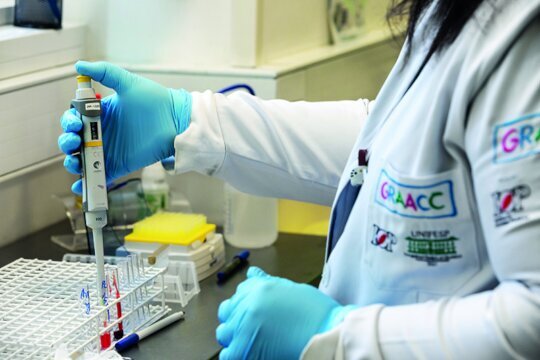By Mariane Rodrigues - Target Comunicacao | Project Leader
During its 30 years of existence, our institution has been incessantly researching new possibilities to further increase the average rate of cure for childhood cancer, which is over 70% in our hospital, above the national average of 64% (reported by the Brazilian National Cancer Institute). Currently, the strategy that emerges as one of the most promising in the search for the best clinical outcome in fighting the disease is genetic sequencing, better known in the scientific community as Next-Generation Sequencing (NGS). It is a technique that allows investigating and knowing the genetic information of a biological material, such as a sample from a tumor or bone marrow. This means learning the code that reveals the “intimacy of the cell” and, founded on such discovery, carrying out complementary investigations, not only bringing new knowledge about diseases, but also enabling options for a more personalized treatment. In practice, it is as if each tumor had its own catalogued “identity”, with specific protocols for dealing with the different types of childhood cancer.
The refined diagnosis enables oncologists to choose a more assertive treatment protocol, based on procedures effectively adopted in previous cases, and also based on genetic events identified in that patient's sample. NGS has greatly expanded treatment possibilities, particularly when combined with the scientific investigations already being conducted in our hospital laboratory of genetics, inaugurated 20 years ago as a center of excellence for the specialty. “With NGS, we were able to help several patients, by determining the tumor diagnosis, as in 50 cases of sarcoma, 77 cases of central nervous system tumors, and 70 cases of leukemia. Since 2001, we have offered a type of investigation considered the gold standard for the diagnosis of leukemias: the classical cytogenetics. Starting in 2018, we have complemented the study with another methodology, a panel of genetic events investigated by fluorescent in situ hybridization, which raised our investigations to international levels”, explains Dr. Silvia Toledo, geneticist and coordinator of our laboratory of genetics.
The laboratory has been a protagonist in conducting robust research and studies, both national and international, with more than 80 scientific articles published or in the process of being published, nine book chapters, and several awards received. In addition, the department contributes to the training of healthcare professionals in specialization, master’s, doctoral and postdoctoral degrees. We have created and maintain a tumor bank, considered one of the largest in Latin America, where we collect and catalogue samples of tumors and molecules from patients. This bank has the raw material that today allows us to perform NGS and safely contribute to precision medicine, which improves the clinical outcome for patients.
Another relevant factor is that knowledge of the genome represents a huge advance in the field of research, stimulating the development of new drugs with individualized responses, in order to overcome the genetic alterations present in the most common neoplasms in childhood and adolescence: leukemias, central nervous system tumors, sarcomas, neuroblastomas and retinoblastomas. This year we are starting the process of expansion of the NGS project, carrying out genetic sequencing of the patient and not just the tumor. “There is a promising future in our mission to provide our children and adolescents with the most advanced and best possible treatment and quality of life”, celebrates Dr. Silvia. We know that there is still a lot to be done and researched to further improve cure rates and move forward in the fight against childhood and adolescent cancer in the country, but our hospital is always focused on the future of pediatric oncology, expanding precision medicine, as well as investing in knowledge and technological innovation.
Project reports on GlobalGiving are posted directly to globalgiving.org by Project Leaders as they are completed, generally every 3-4 months. To protect the integrity of these documents, GlobalGiving does not alter them; therefore you may find some language or formatting issues.
If you donate to this project or have donated to this project, you can receive an email when this project posts a report. You can also subscribe for reports without donating.
Support this important cause by creating a personalized fundraising page.
Start a Fundraiser